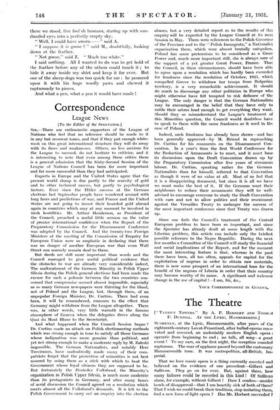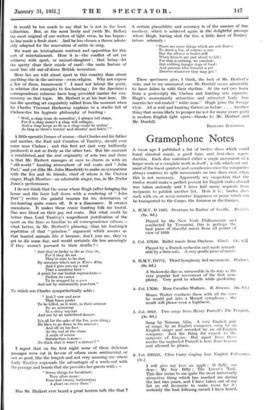The Theatre
[" TANTIVY TOWERS." By A. P. HERBERT AND THOMAS F. DUNHILL. AT THE LYRIC, HAMMERSMITH.] SUDDENLY, at the Lyric, Hammersmith, after years of the eighteenth-century Lovat-Fraserized, after ballad-operas reno- vated and restored, an undeniably modern English opera : operatic from beginning to end ; no talk, all song—a great event ! To my ears, on the first night, the reception sounded rapturous. The roar of applause passed beyond the customary Hammersmith tone. It was metropolitan, all-British, Im- perial.
That we love comic opera is a thing currently asserted and believed on the evidence of one precedent—Gilbert and Sullivan. They go on for ever. But, against them, how many failures could be recorded in this kind Of Sullivan alone, for example, without Gilbert ! Dare I confess—amidst howls of disapproval—that I am heartily sick of both of them? That I wish we could break their tradition, stop imitating them, find a new form of light opera ? Has Mr. Herbert succeeded ?
It would be too much to say that he is not in the least Gilbertian. But, as the most lively and (with Mr. Belloc) the most original of our writers of light verse, he has begun : he has made a fresh start. And he has chosen a theme admir- ably adapted for the renovation of satire in song.
We want an Aristophanic contrast and opposition for this sort of entertainment. Here it is—the conflict of art (or artiness) with sport, or animal-slaughter : that being—let the sporty clear their minds of cant!—the main feature of most fine old out-of-doors British recreation.
More lies are told about sport in this country than about anything else in the universe—even religion. Why not expose
a few of them, humorously ? I need not labour the point, in relation (for example) to fox-hunting ; for the Spectator's
correspondence columns have long provided matter for con- troversy on that topic. Mr. Herbert is at his best here. He has the sporting set exquisitely rallied from the moment when his Charles Viscount Harkaway explains to a studio full of Chelsea-ites his hygienic philosophy of hunting :
" Well, a chap must do somethin', I always tell chaps, For if a chap doesn't a chap will collapse, And a chap keeps as fit as a chap could be wishin' As long as there's huntin' and shootin' and fishhi.' " A little operatic license of course—that Charles and his father and mother, the Earl and Countess of Tantivy, should ever come near Chelsea ; and this first act (not very brilliantly produced) is not so lively as the other two. But the contrast
is established, and the real originality of acts two and three is that Mr. Herbert manages at once to charm us with an " old-world " hunting atmosphere of red coats and " John Peel," and yet (like Mr. John Masefield) to make us sympathize with the fox and its friends, chief of whom is the Chelsea singer, Hugh Heather—an admirable singer, too, in Mr. Trefor Jones's performance.
I do not think that the scene where Hugh (after bringing the house and the hunt ball down with a rendering of " John Peel ") recites the painful reasons for his detestation of fox-hunting quite comes off. It is a dissonance. It creates uneasiness. It makes these comic hunting folk too brutal. One sees blood on their gay red coats. But what could be better than Lord Tantivy's magnificent justification of the sport on the lines so familiar to all correspondence editors— what better, in Mr. Herbert's phrasing, than his lordship's repetition of that " priceless " argument which assures us that hunted animals like it because, don't you see, they've got to die some day, and would certainly die less amusingly if they weren't pursued to their deaths ? :
And they're lucky to die as they do, For if they do not They're sure to be shot
By someone who's not in Who's Who.
And I give you my word
That a sensitive bird— A point for our foolish reproachers—
Prefers its career
To be stopped by a peer And not by unmannerly poachers."
To which son Charles sympathetically adds :
" And I vow and aver That foxes prefer To be killed, as it were, in their armour By an aristocrat In a shiny top-hat And not by an underbred fanner.
It's all for the sake of the fox, poor thing; He likes to go down in his armour ; And oft on his face At the end of the chase A smile of serene
Satisfaction is seen—
To think that it wasn't a farmer ! "
I regret that on the first night some of these delicious Passages were cut in favour of others more sentimental, or not so good, like the longish and not very amusing one where Lady Tantivy expounds the advantages of a week-end with the peerage and boasts that she provides her guests with :-
"Seven things for breakfast; Very ofteri more:
Four and twenty bathrooms; A ghost on every floor."
Has Mr. 'Herbert ever heard a great hostess talk like that ? A certain plausibility and accuracy is of the essence of fine mockery, which is achieved again in the delightful passage
where Hugh, having shot the fox, a little knot of flunkey intone solemnly : " There are some things which are not done :
To shoot a fox, of course, is ono.
But the offence is fouler still When hounds are just about to kill : For this is nothing, we conclude, But robbing hungry dogs of food : And persons who torment a pot Deserve whatever they may get."
These specimens give, I think, the best of Mr. Herbert's vein; and to my unmusical ears Mr. Dunhill seems admirably
to have fallen in with their rhythm. At the end (we learn from a postscript) the Chelsea and hunting sets separate.
Hugh's momentarily attractive and attracted Lady Ann marries her red-coated " white man." Hugh joins the Savage Club. All is well and hunting thrives as before . . . Another thing that seems likely to prosper (as not for many years past) is modern English light opera—thanks to Mr. Herbert and Mr. Dunhill.
RICHARD JENNINGS.







































 Previous page
Previous page